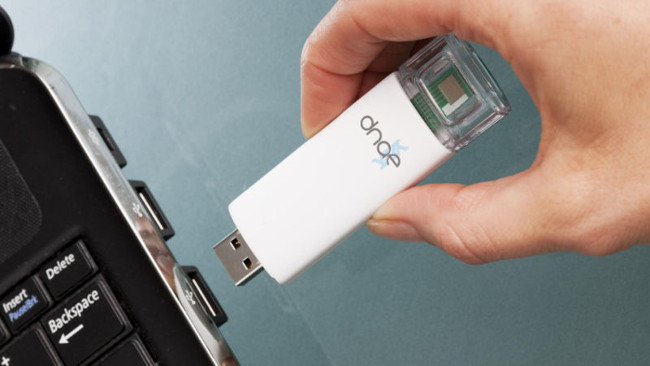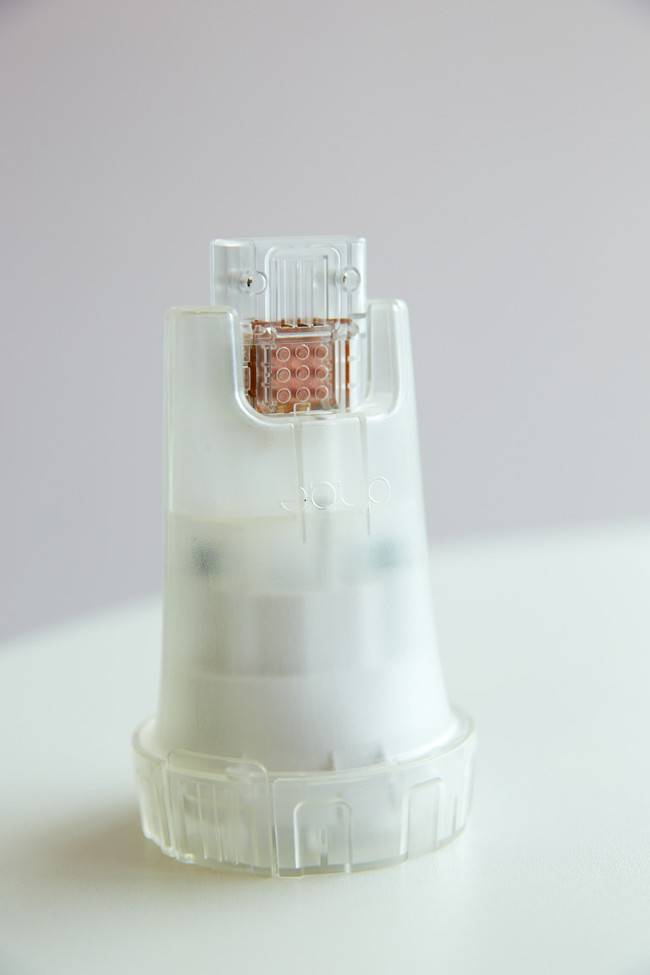New research: Testing HIV by USB
Scientists in the UK have invented USB that can accurately and quickly measure HIV virus levels in patients' blood.
Medical equipment by scientists at Imperial College London combined with DNA Electronics, and all it takes is simply to use a drop of blood to detect HIV . Then, USB generates electrical signals that can be read by computers, laptops or handheld devices.

This test device takes only 21 minutes to produce results.(Image source: Imperial College London / DNA Electronics).
This disposable device is used for HIV-infected patients to monitor their own treatment and the medical team can check patients taking their medications. Moreover, this technology is particularly effective for patients in remote areas of the world, where access to testing facilities is not easy.
The new study is published in Scientific Reports, which shows that this USB device is not only very accurate, but can also produce results in less than 30 minutes. Current tests to detect levels of HIV in the blood usually take at least three days or longer and need to send blood samples to the laboratory. In many parts of the world, especially those with the highest number of people with HIV, there are no such tests. In the most recent study, the USB stick was tested 991 blood samples with an accuracy of 95%, with the average time to produce results only 21 minutes.

This technology is still in the early stages of implementation.(Image: Imperial College London / DNA Electronics).
Just drop a drop of blood into this USB, it automatically analyzes the HIV-1 virus concentration through changes in acidity. This USB device uses a mobile phone chip to convert information into electrical signals and then electrical signals are sent to the USB stick, giving results into the program on a computer or device. electronic .
Although the technology is still in its early stages, it may allow patients to regularly monitor their viral levels in the same way as people with diabetes check their blood sugar levels.
Currently, antiretroviral drugs - known as antiviral drugs , reduce viral levels to near zero. However, in some cases the drug may stop working, perhaps because the HIV virus has developed resistance to the drug. The new type of USB can detect an increase in the level of HIV virus and has the potential in therapeutic drug problems and treatments for patients.
" Monitoring viral levels is very important for success in HIV treatment. At this point, testing often requires expensive and complex equipment that can take a few days to get. We did the work with this device, about the size of a large copier and scaled it down to a USB chip , "said Dr Graham Cooke - lead research author in a statement. .
- The ancestor cannot be identified by DNA testing
- Identify crime in 90 minutes thanks to a new DNA testing machine
- Use immunity to reduce prostate cancer risk
- Simulation
- DNA testing helps prevent illness
- 6 scientists achieved brilliant achievements thanks to self-testing
- Australia: Applying a new DNA testing method with an 79% accuracy rate
- America could be sued for testing syphilis in Guatemala
- New research turns smartphones into virus and infection testing devices
- Video: NASA tests the ability of spacecraft to safely land
- Why shouldn't IQ be tested by genetic testing?
- Philips Minicare: Future on-site testing system
 Green tea cleans teeth better than mouthwash?
Green tea cleans teeth better than mouthwash? Death kiss: This is why you should not let anyone kiss your baby's lips
Death kiss: This is why you should not let anyone kiss your baby's lips What is salmonellosis?
What is salmonellosis? Caution should be exercised when using aloe vera through eating and drinking
Caution should be exercised when using aloe vera through eating and drinking